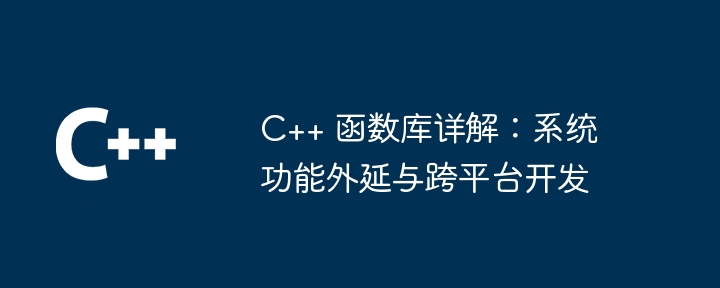
The C function library extends the capabilities of the C language by providing predefined functions and classes, and supports the following key functions: System function extension: access to native system functions such as file operations, network communications, and graphics processing. Cross-platform development: Writing programs that run on different operating systems.

Detailed explanation of C function library: system function extension and cross-platform development
Introduction
The C function library provides a series of predefined functions and classes designed to extend the functionality of the C language and simplify cross-platform development. This article explores some key aspects of C libraries, including system functionality and cross-platform development.
System function extension
The C function library contains functions that allow developers to access native system functions, such as file system operations, network communications, and graphics processing.
For example, to open a file, you can use the ofstream class in the fstream header file:
#include <fstream>
int main() {
// 打开一个名为 "example.txt" 的文件进行写入
std::ofstream outfile("example.txt");
// 将 "Hello, world!" 写入文件
outfile << "Hello, world!" << std::endl;
// 关闭文件
outfile.close();
return 0;
}Cross-platform development
The C function library provides cross-platform support, allowing developers to write programs that can run on different operating systems.
The following is how to use the unistd.h header file to obtain the current working directory across platforms:
#include <unistd.h>
int main() {
// 获取当前工作目录
char* cwd = getcwd(NULL, 0);
// 在控制台上打印当前工作目录
std::cout << "Current working directory: " << cwd << std::endl;
// 释放内存
free(cwd);
return 0;
}Practical case
The following is an example of using a C function library to develop a cross-platform command line application:
#include <iostream>
#include <fstream>
#include <unistd.h>
int main() {
// 获取用户输入的文件名
std::string filename;
std::cout << "Enter the file name: ";
std::getline(std::cin, filename);
// 检查文件是否存在
std::ifstream infile(filename);
if (infile.is_open()) {
// 文件存在,读取并打印内容
std::string line;
while (std::getline(infile, line)) {
std::cout << line << std::endl;
}
} else {
// 文件不存在,显示错误消息
std::cout << "Error: File not found" << std::endl;
}
// 关闭文件
infile.close();
return 0;
}This program can read and print the specified file when running on different operating systems (such as Linux, macOS and Windows). content.
The above is the detailed content of Detailed explanation of C++ function library: system function extension and cross-platform development. For more information, please follow other related articles on the PHP Chinese website!




